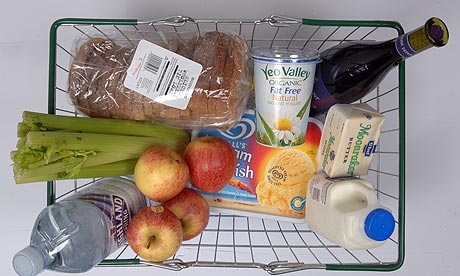UK inflation falls back to 4%
• March CPI is 4%, down from February's 4.4%
• Pressure eases on Bank of England for immediate rate rise
• Cheaper food and drink behind fall in inflation
• RPI, used for pay bargaining, falls to 5.3% from 5.5%
• Pressure eases on Bank of England for immediate rate rise
• Cheaper food and drink behind fall in inflation
• RPI, used for pay bargaining, falls to 5.3% from 5.5%
- guardian.co.uk,
- Article history

Cheaper food and drink costs helped inflation fall to 4% last month. Photograph: Martin Godwin
Pressure eased on the Bank of England for an immediate increase in interest rates after the latest figures for the cost of living showed a surprise drop in the annual inflation rate.
Data released by the Office for National Statistics revealed that inflation as measured by the consumer prices index dropped from 4.4% in February to 4% last month – the first decline since July last year.
Sharp drops in the cost of food and drink were the main factors behind the fall, which wrong-footed City analysts who had been predicting that inflation in March would edge closer to 5%.
Financial markets have been fretting in recent weeks that UK inflation has been running at more than double the government's 2% target for the CPI, but today's easing of upward price pressures will stifle calls for borrowing costs to rise next month.
Three members of the Bank's nine-strong monetary policy committee have been calling for interest rates to be raised from their emergency level of 0.5% but the majority on the MPC has argued that higher inflation has been the result of temporary factors beyond the Bank's control such as surging oil prices and higher VAT.
Today's ONS release showed that inflation as measured by the retail prices index – traditionally used as the benchmark for pay deals – also fell last month, from 5.5% to 5.3%.
Hetal Mehta, UK economist at Daiwa Capital Markets, said: "When it comes to inflation, a surprise on the downside is not something we have had for a very long time. So today's unexpected fall is welcome, and will take some pressure off the MPC, further diminishing the prospects of a May rate increase."
But Vicky Redwood, UK analyst at Capital Economics, said the respite might only be temporary, with recent rises in energy prices potentially pushing the headline rate higher in the coming months. She added: "Nonetheless, the fall in the core inflation rate (excluding energy costs and food) from 3.4% to 3.2% is clearly reassuring – and perhaps suggests that retailers are reacting to the recent weakness on the high street."
Britain's goods trade deficit with the rest of the world unexpectedly narrowed in February to its smallest since February 2010 at £6.8bn, separate statistics showed today. Economists had forecast a deficit of £8.1bn.
No comments:
Post a Comment